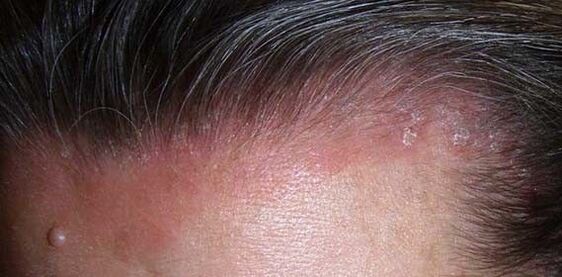
The first manifestations of psoriasis often appear on the head, and then spread throughout the body. Head psoriasis presents with itching and risk of bacterial complications. If you suspect the psoriatic nature of the rashes, you should immediately consult a doctor; the disease responds well to treatment from the beginning. The article contains all the information about the symptoms and all the known treatments for this form of the disease.
Causes of psoriasis on the head
It is a non-contagious chronic dermatological process that develops in people with hereditary predisposition. The causes of psoriasis on the head and the mechanism of its development are not fully understood. But it has been established that the process develops against the background of metabolic and immunological disorders. The body loses control over the division of epithelial skin cells - they begin to divide much faster. Just as quickly, signs of keratinization appear, manifested in the form of peeling. At the same time, inflammatory processes develop on the skin.
Main cause of scalp psoriasisit is an inherited predisposition. Scientists are trying to identify the genes responsible for the transmission of the disease from generation to generation. Separate altered areas, related to different genes, have already been established and are found in patients and their close relatives.
But a person who has a genetic predisposition does not necessarily get sick. Equally important are external and internal predisposing factors. Scalp psoriasis begins in genetically predisposed individuals due to exposure to the following factors:
- mechanical irritation of the skin (with a hairbrush with hard teeth; injury to small wounds and scabs that appear with seborrhea, etc. );
- exposure to cold;
- transferred infectious diseases; often after streptococcal impetigo - purulent rashes mainly on the skin of the face; develops in children and becomes an impetus for the development of an autoimmune process;
- chronic stress and high loads;
- frequent smoking, alcohol abuse;
- diet disorders: irregular malnutrition, dry food, excessive consumption of high-calorie foods and hot spices;
- with hormonal disorders that affect the state of the sebaceous glands of the skin: obesity, imbalance of sex hormones, diabetes mellitus, diseases of the thyroid gland, pituitary gland, hypothalamus;
- in diseases of the liver and kidneys with impaired function of these organs; toxins are neutralized in the liver and excreted from the body through the kidneys; intoxication can become a starting point in the development of the disease.
Under the influence of one or more factors, the interaction of the organism with the environment is disrupted. The metabolism of proteins, fats and carbohydrates is disturbed, which causes the acceleration of metabolic processes in the skin and its peeling.
Psoriasis of any localization can spread throughout the body, so do not delay treatment.
Changes in the immune system manifest themselves in the form of increased sensitivity of the skin to any external influences (besides frequent combing or dyeing of hair). In response to such influences, antibodies are produced against their own cells, which provokes the appearance of an autoimmune inflammatory process. The reasons why inflammation begins are not yet fully understood. This is one of the priorities of medicine in the direction of psoriasis treatment.
Symptoms of psoriasis of the scalp
Psoriasis on the head manifests itself in the form of characteristic symptoms. The disease can begin acutely with multiple rashes (vulgar form of psoriasis) or gradually with itching and peeling of the skin, and only then do characteristic rashes appear (seborrheic form).
The most frequent onset is gradual, in the form of dandruff and flaking. In the early stages, these are small areas in the occipital region. The scaling spreads to larger areas and itching begins. Constant scratching of the skin contributes to its thickening and the appearance of abrasions. What is scalp psoriasis like? The initial symptoms of psoriasis on the head in the photo look like this:
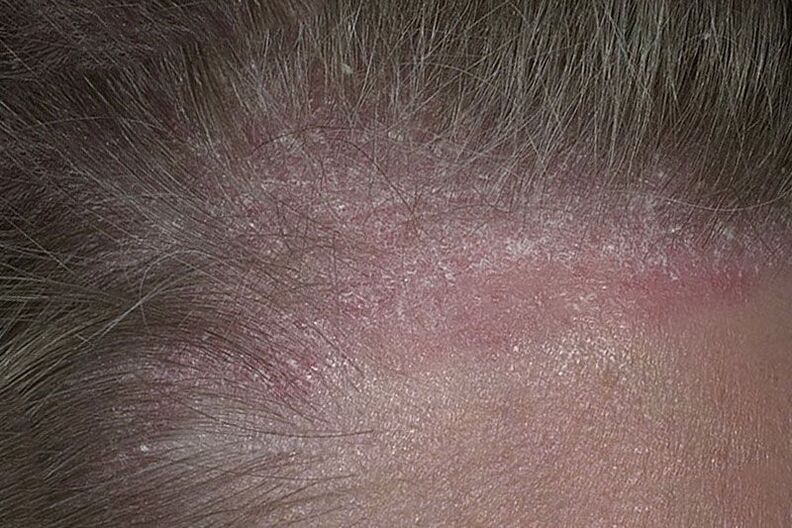
In the area of scratches and abrasions, redness first appears, and then small inflammatory nodules and papules, surrounded by a shiny border that rises above the surface of the skin. Accompanied by severe itching, the rashes increase in size and merge with each other. The characteristics of the rashes are:
- white "chips" covering the papules; when scratched, it looks like a speck of stearin; in the seborrheic form, the scales are yellowish in color, and the phenomenon of stearin stain is not so pronounced;
- if you scrape off all the "chips", a smooth translucent surface opens;
- further scraping leads to the appearance of blood droplets on the surface - "blood spray".
In the photo, three signs look like this:
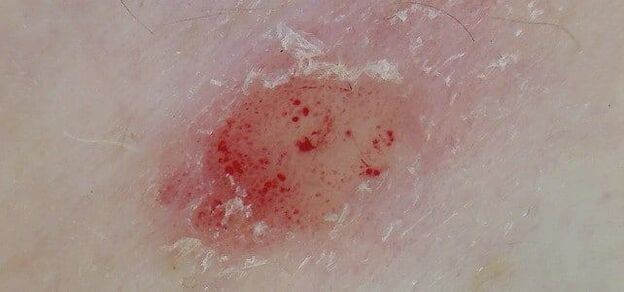
These three characteristic manifestations distinguish scalp psoriasis from seborrheic dermatitis, with which it is easily confused. In the future, the papules merge and form psoriatic plaques, which have a different configuration and sometimes spread over the entire surface of the head.
The course of psoriasis of the scalp can be mild with the appearance of single rashes in the initial stage. These rashes then go through all three stages of development. In severe form, the rashes occupy the entire significant area and spread to the face and neck in the form of a crown - an inflammatory border covered with silvery scales. The roots of the hair are not affected, but a bacterial, fungal or mixed infection often joins the psoriatic process, which leads to complications that are not so easy to cure. This is what the crown looks like:
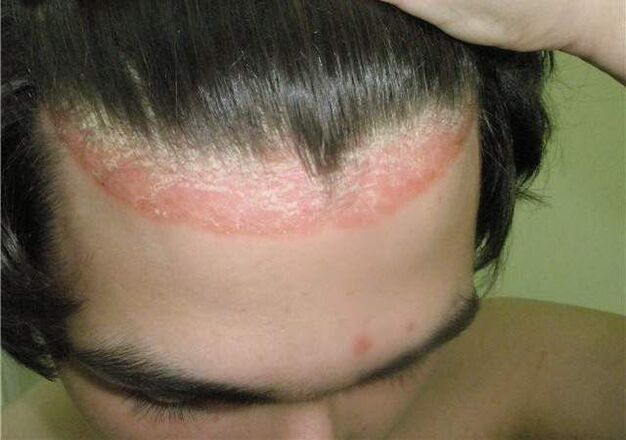
Stages of psoriasis on the head.
The disease continues for a long time, exacerbations are replaced by remissions. The frequency of exacerbations and the severity of symptoms depend on the presence of provoking factors.
progressive stage
Rash and widespread inflammation, accompanied by intense itching. At the initial stage, there is a Koebner symptom - the appearance of psoriatic rashes at the site of scratches and abrasions.
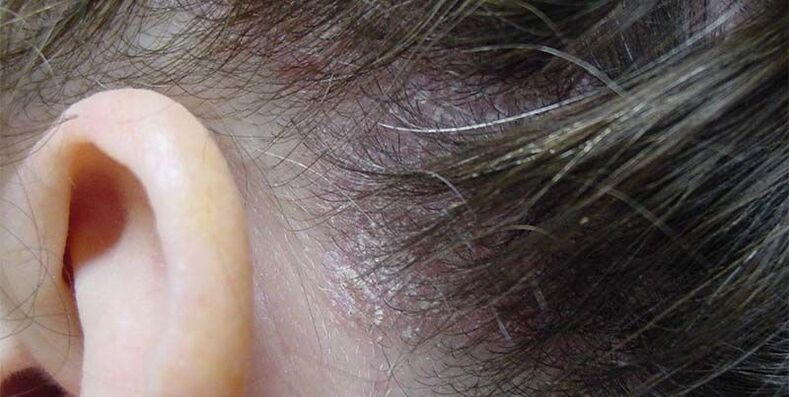
Stationary
The process is in the same state, not spreading, but not fading either.
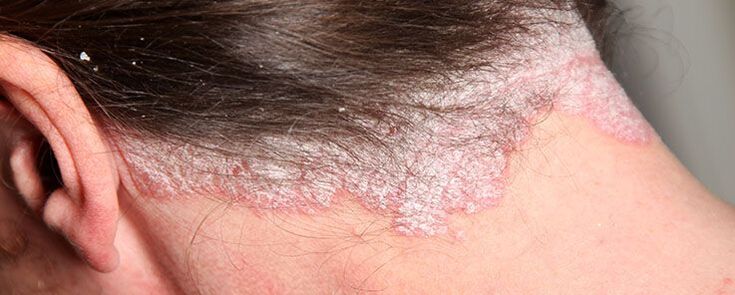
Regressive
The process gradually subsides, the itching disappears, the rash pales, the inflammatory infiltrate decreases, gradually acquiring the appearance of a spot; the color of the rashes becomes pale, starting from the center, forming ring-shaped figures with a brighter edge. Sometimes they begin to pale from the periphery to the center, and then take the form of whitish rings (a symptom of psoriasis on the head is Voronov's pseudoatrophy). The healing phase can take a long time and little by little only white depigmented spots remain on the skin.
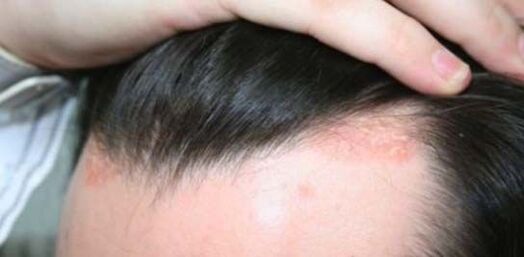
Methods of treatment of psoriasis on the head
Scalp psoriasis requires systematic treatment under the supervision of a doctor. Of decisive importance is a mobile lifestyle, quitting smoking and alcohol, dieting. It is necessary to treat the disease in a complex way, apply techniques taking into account the characteristics of the patient's body. Complex therapy can include modern European methods, drug treatment, as well as eastern methods proven for centuries. Such treatment can immediately significantly improve the patient's condition and lead to the development of a stable remission within a few weeks.
PRP - therapy - the method is based on the ability of platelets (red platelets) to secrete a growth factor that stimulates the regenerative abilities of cells. Using centrifugation, the patient's blood is enriched with platelets and then punctually injected into the scalp. The technique can significantly accelerate the onset of remission and prevent the development of relapses.
Autohemotherapy: the treatment is performed by intramuscular injection of a small amount of blood taken from the patient's vein. This has a general stimulating effect, restores the epithelium of the head. After treatment, a stable remission is observed.
Reflexology is the impact in various ways on special points of the body, reflexively associated with organs and tissues. One of the oldest and most effective traditional methods of treatment. The impact on the points can be done by acupuncture (acupuncture), cauterization, massage, etc. Treatment of psoriasis on the head with these methods has been practiced in Eastern medicine for thousands of years. Treatments are performed by a reflexologist.
Vacuum therapy, the effect of rarefied air on biologically active points, is one of the methods of reflexology. It can be carried out using cans or special equipment. Promotes rapid recovery of altered tissues. As a result of the use of vacuum therapy, the affected areas are significantly reduced.
Phytotherapy: Medicinal plants are widely used by dermatologists in their practice in the form of infusions, decoctions and prepared pharmaceutical forms. When used correctly as part of a complex treatment, they are very effective both in the early stages of the disease and in its long-term forms. If you add phytotherapy, you increase the effectiveness of other methods of treatment, decrease the risk of developing undesirable effects of drugs.
Treatment of psoriasis on the head in the clinic.
In a specialized clinic, this disease is treated by dermatologists who are trained and have clinical experience in treating this disease with all currently known methods. In their work, they use new Western methods of medical treatment in combination with traditional Eastern methods that have been used successfully by doctors in ancient China and Tibet for thousands of years.
To avoid relapse, it is necessary to eliminate the cause of the disease.
Professional clinics use a variety of methods with an individual approach to each patient. Various complexes of traditional methods in combination with drug treatment can permanently save the patient from problems with the skin of the scalp.
The effectiveness of treatment in the clinic is noted in its comments and reviews not only by patients receiving regular supportive treatment, but also by colleagues from other Moscow clinics.
Prevention of psoriasis on the head
Prevention of psoriasis on the head is especially necessary for people with a hereditary predisposition who have sick relatives. It includes eliminating the impact of the following factors:
- any prolonged skin exposure;
- malnutrition and sedentary lifestyle;
- prolonged stress and heavy loads;
- smoking and alcohol abuse;
- hormonal disorders - if such disorders are suspected, you should immediately contact an endocrinologist;
- intoxication - in time to treat all chronic diseases that contribute to the deterioration of metabolism and immunity.
A dermatologist can tell you how to cure psoriasis on the head after an examination. Therefore, you should not delay on the advice of a specialist, since the initial stages of the disease are much easier to treat. Can we cure this process? It is completely impossible to cure the disease, but if a person receives regular treatment, then there is a great chance to get rid of relapses for a long time.
Diet for psoriasis of the head?
There is no special diet, but the treatment of scalp psoriasis involves 4 proper meals a day containing all the necessary ingredients for the body in the diet. Foods that irritate the skin should not be present at the table:
- spicy, salty, sour;
- fruits rich in essential oils (fresh garlic and onion, radish);
- fried, smoked, canned foods;
- caffeinated drinks - strong tea, coffee, coke, etc. ;
- alcoholic beverages - contribute to the development of relapses of the disease.
It has been established that meat food provokes an exacerbation, so the diet should contain more foods containing complex carbohydrates, lean meat, cottage cheese, yogurt, etc.
Pharmacological therapy for scalp psoriasis?
Medicines are selected according to the patient's condition and the presence of certain symptoms of the disease. At the initial stage of psoriasis on the head, the following external agents are used:
- when wet, solutions and creams are prescribed that eliminate these symptoms and prevent bacterial and fungal infections;
- if the skin is dry, then it is treated with ointments; ointment with salicylic acid - has a softening effect; tar ointments have the same effect; ointments with zinc and an analogue of vitamin D3 + betamethasone glucocorticoid help a lot - they help to quickly eliminate the symptoms of psoriasis;
- ointments and creams with corticosteroid hormones are prescribed in the treatment of common forms of psoriasis on the head;
- shampoos are widely used; so, tar shampoos relieve inflammation, soften crusts; shampoo with zinc has an antiseptic and softening effect, relieves inflammation; Shampoos have been used for a long time.
Folk remedies for psoriasis on the head?
Is it possible to treat scalp psoriasis with home remedies? Most specialists use home remedies for symptomatic treatment (elimination of certain symptoms) of this disease. But you must be clear that:
- it is necessary to treat the disease with folk remedies on the recommendation of a dermatologist;
- it is impossible to cure the disease only with folk remedies; dermatologists prescribe complex therapy in combination with traditional medicine.























